Navigation
Install the app
How to install the app on iOS
Follow along with the video below to see how to install our site as a web app on your home screen.
Note: This feature may not be available in some browsers.
More options
You are using an out of date browser. It may not display this or other websites correctly.
You should upgrade or use an alternative browser.
You should upgrade or use an alternative browser.
Skimmer Time
- Thread starter GMay
- Start date
-
- Tags
- nutrient control skimmer
- Tagged users None
Reffering to the OP I'd toss the skimmer. It doesn't matter where you look research is showing whether it's sustainable farming or sustaining our own physical and mental health the proper microbial balance is essential. Feldman, et al, showed skimmers skew the bacterial counts and significantly reduce them as well. hey also showed skimmers don't remove as much as we thought. Additionally, de Goeij showed cryptic zones with their cryptic sponges remove labile DOC 1000X faster than bacterioplankton. Skimmers also do not remove the hydrophylic compounds that promote shifts in the coral holobiont to heterotrophic that draw down oxygen levels in the coral mucus suffocating them and potentially promoting pathogenic microbes (See Rower's book "Coral Reefs in the Microbial Seas" or his video linked below). Since additional discussion has looked at nutrients I'd point out we need to be looking at total nitrogen and total phosphorus not just the inorganic forms nitrate and PO4. There are some additional links below for those intersted in reading more. And for those wondering where cyano (and corals if necessary, see the link to diazotrophs) they have the enzymes to convert N2, free nitrogen, into nitrates. There's also some links on algae
Forest Rohwer "Coral Reefs in the Microbial Seas"
Changing Seas - Mysterious Microbes
Nitrogen cycling in hte coral holobiont
BActeria and Sponges
Richard Ross What's up with phosphate"
Ammonium Uptake by Symbiotic and Aposymbiotic Reef Corals
 www.ingentaconnect.com
www.ingentaconnect.com
Amino acids a source of nitrogen for corals
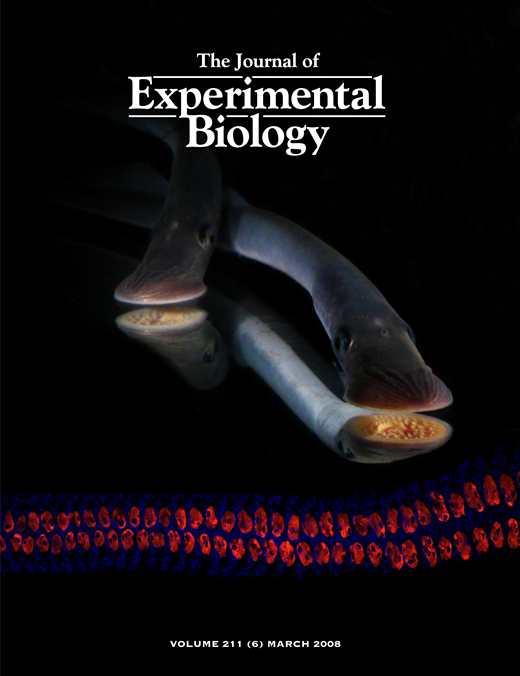
 journals.biologists.com
journals.biologists.com
Urea a source of nitrogen for corals
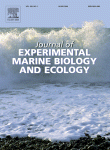
 www.sciencedirect.com
www.sciencedirect.com
Diazotrpophs a source of nitrogen for corals

 pubmed.ncbi.nlm.nih.gov
pubmed.ncbi.nlm.nih.gov
Context Dependant Effects of Nutrient Loading on the Coral-Algal Mutualism

 www.researchgate.net
www.researchgate.net
 www.cambridge.org
An Experimental Mesocosm for Longterm Studies of Reef Corals
www.cambridge.org
An Experimental Mesocosm for Longterm Studies of Reef Corals
Phosphate Deficiency:
Nutrient enrichment can increase the susceptibility of reef corals to bleaching:
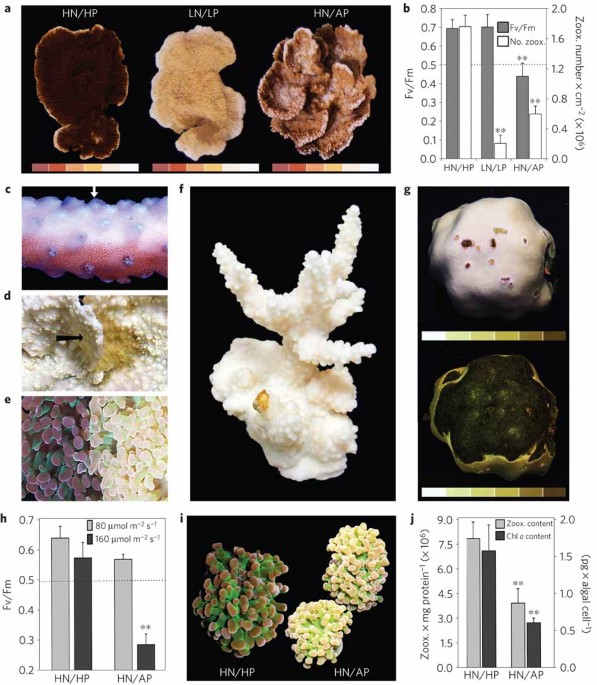
 www.nature.com
www.nature.com
Ultrastructural Biomarkers in Symbiotic Algae Reflect the Availability of Dissolved Inorganic Nutrients and Particulate Food to the Reef Coral Holobiont:

 www.frontiersin.org
www.frontiersin.org
Phosphate deficiency promotes coral bleaching and is reflected by the ultrastructure of symbiotic dinoflagellates
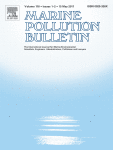
 www.sciencedirect.com
www.sciencedirect.com
Effects of phosphate on growth and skeletal density in the scleractinian coral Acropora muricata: A controlled experimental approach
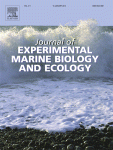
 www.sciencedirect.com
www.sciencedirect.com
High phosphate uptake requirements of the scleractinian coral Stylophora pistillata
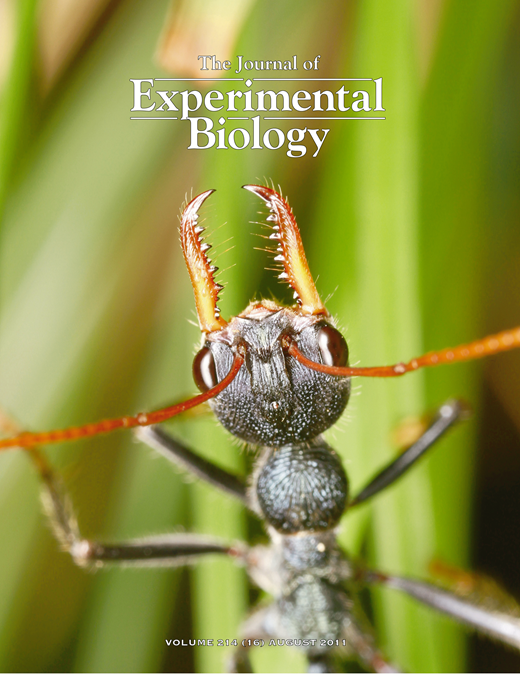
 jeb.biologists.org
jeb.biologists.org
Phosphorus metabolism of reef organisms with algal symbionts
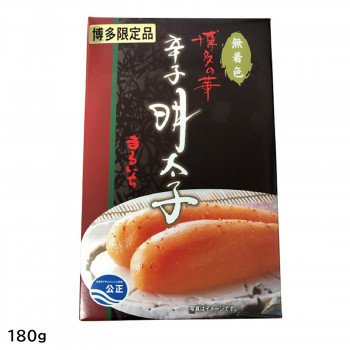
Sponge symbionts and the marine P cycle
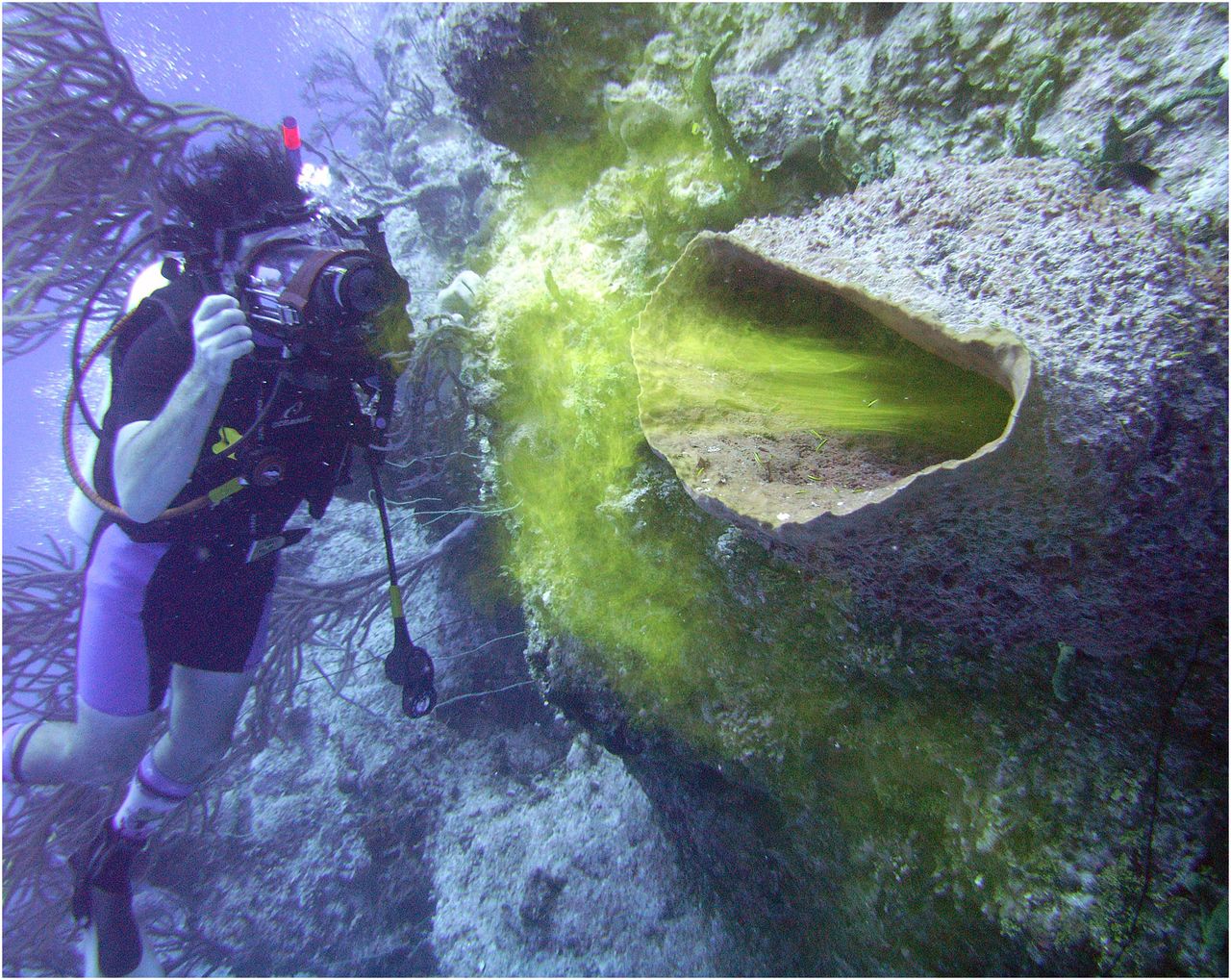
 www.pnas.org
www.pnas.org
Phosphorus sequestration in the form of polyphosphate by microbial symbionts in marine sponges
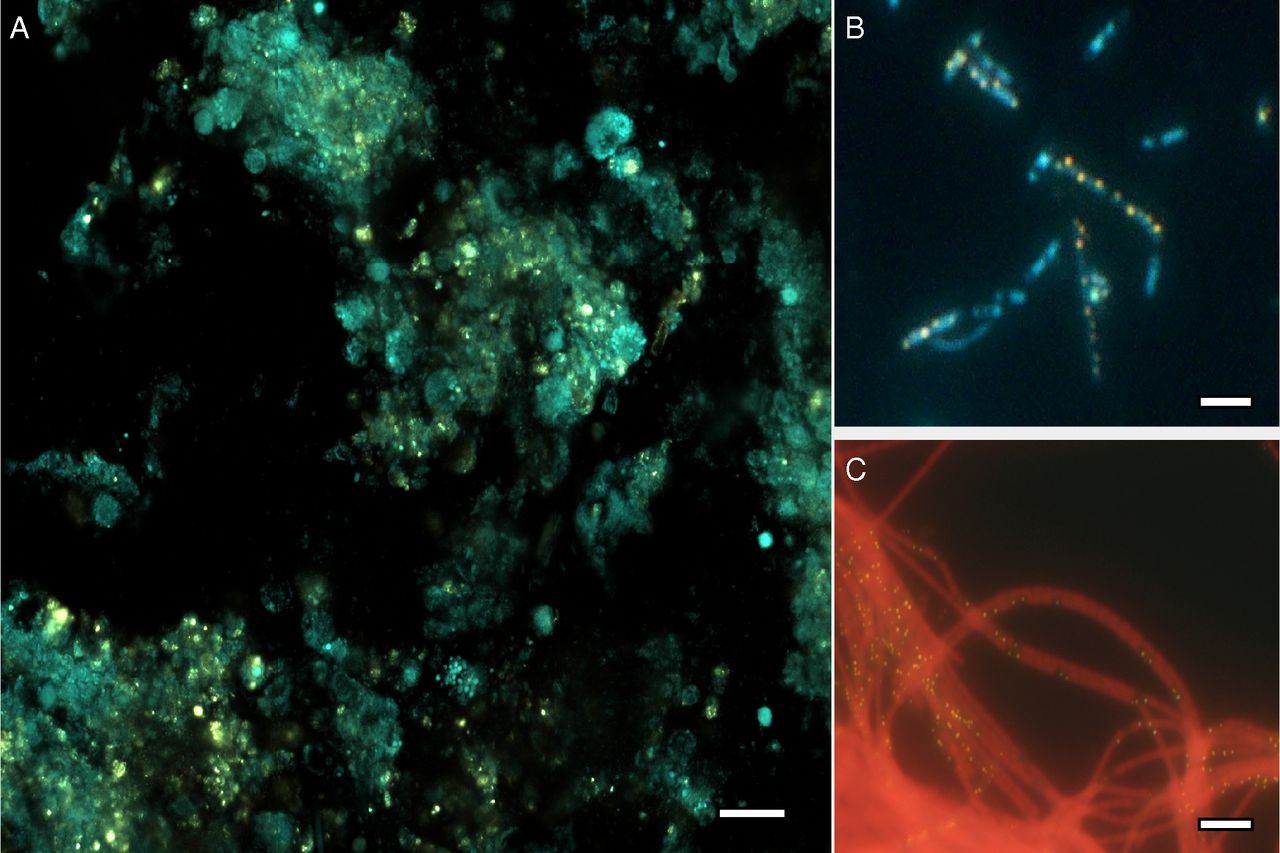
 www.pnas.org
www.pnas.org
Indirect effects of algae on coral: algae‐mediated, microbe‐induced coral mortality
Coral seperated from algae with a .02 µm filter die. Treatment with aampicillan prevents death.
 onlinelibrary.wiley.com
onlinelibrary.wiley.com
Influence of coral and algal exudates on microbially mediated reef metabolism.
Coral DOC improves oxygen (autotrophy), algae DOC reduces oxygen (heterotrophy).
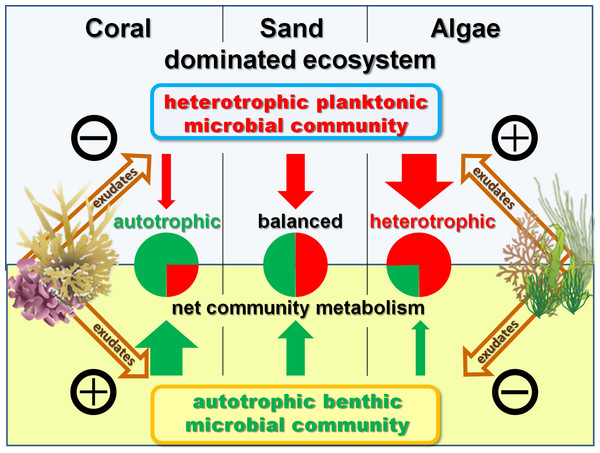
 peerj.com
peerj.com
Role of elevated organic carbon levels and microbial activity in coral mortality
Effects of Coral Reef Benthic Primary Producers on Dissolved Organic Carbon and Microbial Activity
Algae releases significantly more DOC into the water than coral.
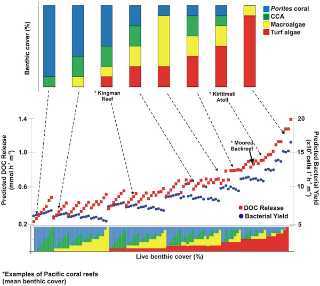
 journals.plos.org
journals.plos.org
Pathologies and mortality rates caused by organic carbon and nutrient stressors in three Caribbean coral species.
Starch and sugars (doc) caused coral death but not high nitrates, phosphates or ammonium.
Visualization of oxygen distribution patterns caused by coral and algae
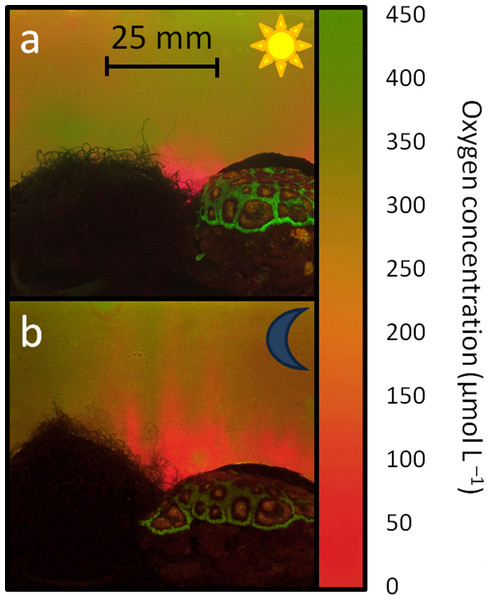
 peerj.com
peerj.com
Biological oxygen demand optode analysis of coral reef-associated microbial communities exposed to algal exudates
Exposure to exudates derived from turf algae stimulated higher oxygen drawdown by the coral-associated bacteria.

 www.ncbi.nlm.nih.gov
www.ncbi.nlm.nih.gov
Microbial ecology: Algae feed a shift on coral reefs
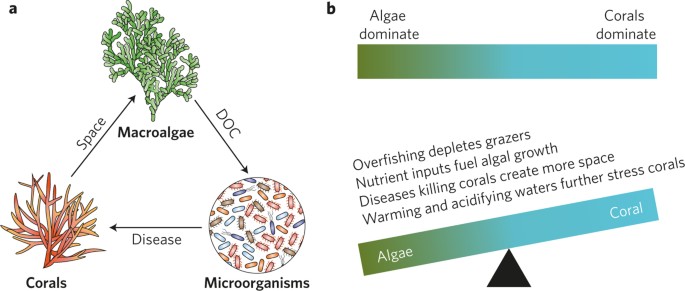
 www.nature.com
www.nature.com
Coral and macroalgal exudates vary in neutral sugar composition and differentially enrich reef bacterioplankton lineages.

 www.ncbi.nlm.nih.gov
www.ncbi.nlm.nih.gov
Sugar enrichment provides evidence for a role of nitrogen fixation in coral bleaching
 onlinelibrary.wiley.com
onlinelibrary.wiley.com
Elevated ammonium delays the impairment of the coral-dinoflagellate symbiosis during labile carbon pollution
(here's an argument for maintaining heavy fish loads if you're carbon dosing)
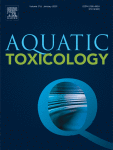
 www.sciencedirect.com
www.sciencedirect.com
Excess labile carbon promotes the expression of virulence factors in coral reef bacterioplankton
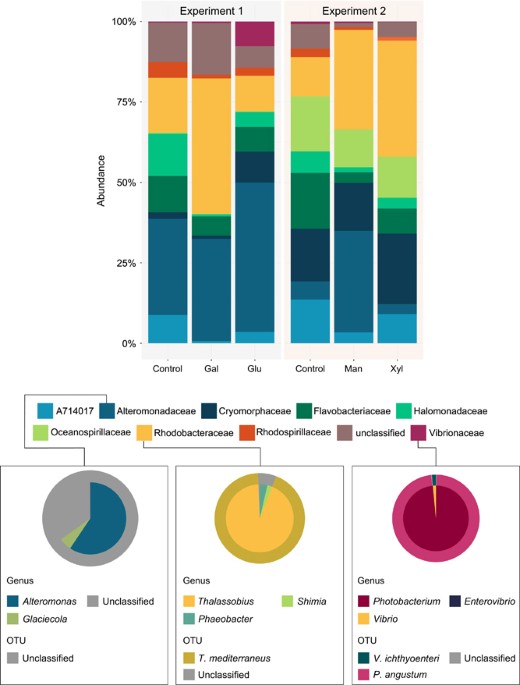
 www.nature.com
www.nature.com
Unseen players shape benthic competition on coral reefs.

 www.ncbi.nlm.nih.gov
www.ncbi.nlm.nih.gov
Allelochemicals Produced by Brown Macroalgae of the Lobophora Genus Are Active against Coral Larvae and Associated Bacteria, Supporting Pathogenic Shifts to Vibrio Dominance.

 www.ncbi.nlm.nih.gov
www.ncbi.nlm.nih.gov
Macroalgae decrease growth and alter microbial community structure of the reef-building coral, Porites astreoides.

 www.ncbi.nlm.nih.gov
www.ncbi.nlm.nih.gov
Macroalgal extracts induce bacterial assemblage shifts and sublethal tissue stress in Caribbean corals.

 www.ncbi.nlm.nih.gov
www.ncbi.nlm.nih.gov
Biophysical and physiological processes causing oxygen loss from coral reefs.
Global microbialization of coral reefs
DDAM Proven
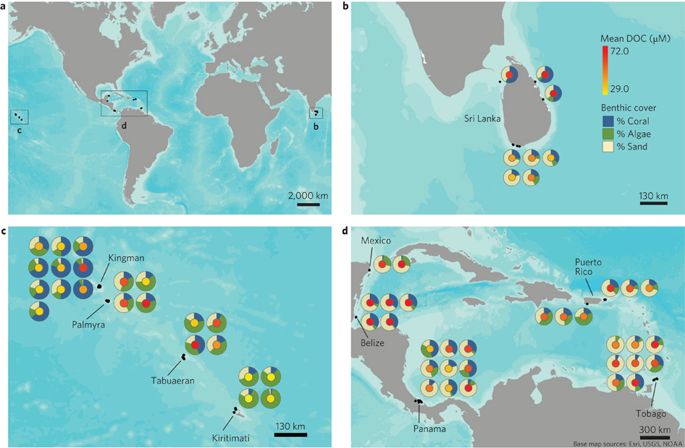
 www.nature.com
www.nature.com
Coral Reef Microorganisms in a Changing Climate, Fig 3

 www.ncbi.nlm.nih.gov
www.ncbi.nlm.nih.gov
Ecosystem Microbiology of Coral Reefs: Linking Genomic, Metabolomic, and Biogeochemical Dynamics from Animal Symbioses to Reefscape Processes
Because sponges are essential players in the carbon, nitrogen and phosphorus cycle(s) on reefs here's some links to research done with them.
Element cycling on tropical coral reefs.
This is Jasper de Geoij's ground breaking research on reef sponges. (The introduction is in Dutch but the content is in English.)
Sponge symbionts and the marine P cycle

 www.pnas.org
www.pnas.org
Differential recycling of coral and algal dissolved organic matter via the sponge loop.
Sponges treat DOC from algae differently than DOC from corals
 besjournals.onlinelibrary.wiley.com
besjournals.onlinelibrary.wiley.com
Surviving in a Marine Desert The Sponge Loop Retains Resources Within Coral Reefs
Dissolved organic carbon and nitrogen are quickly processed by sponges and released back into the reef food web in hours as carbon and nitrogen rich detritus.
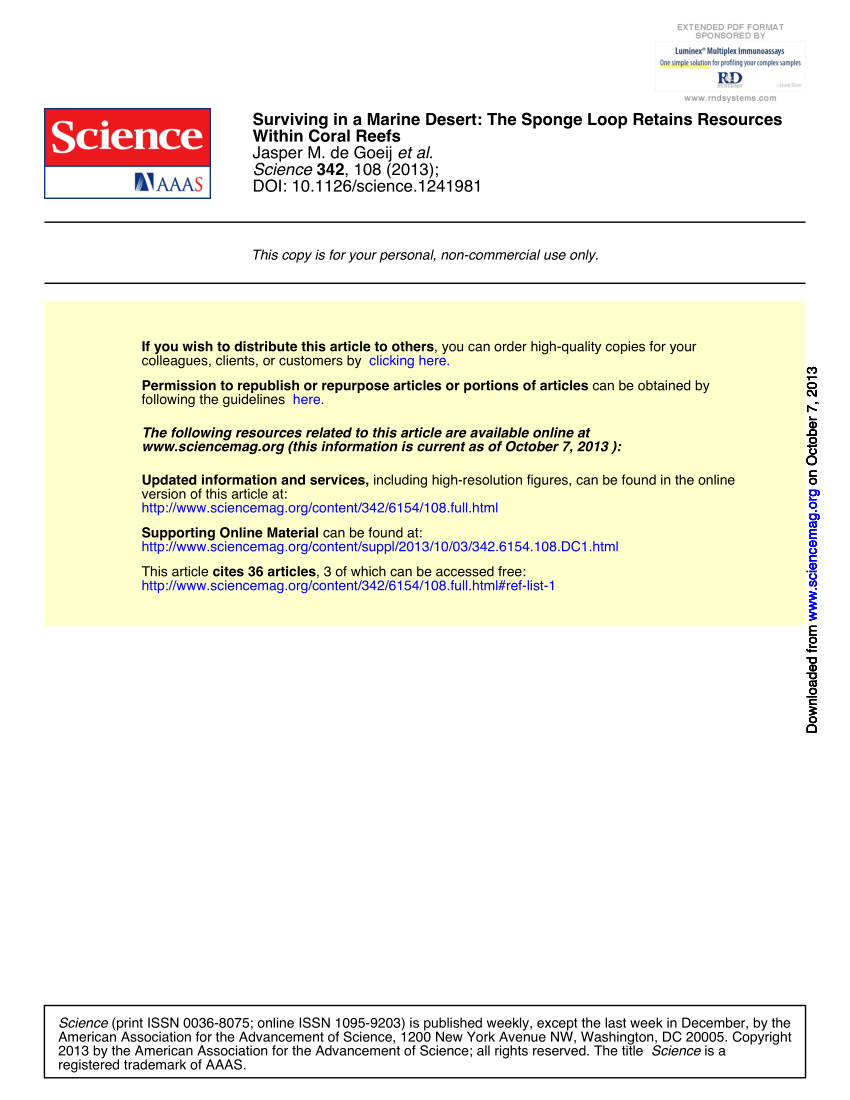
 www.researchgate.net
www.researchgate.net
Natural Diet of Coral-Excavating Sponges Consists Mainly of Dissolved Organic Carbon (DOC)

 www.ncbi.nlm.nih.gov
www.ncbi.nlm.nih.gov
The Role of Marine Sponges in Carbon and Nitrogen Cycles of COral Reefs and Nearshore Environments.
 search.proquest.com
search.proquest.com
And since we're discussing favorable and not so favorable bacteria here's a paper looking at how different corals and polyps are influencing the bacteria in the water column.
Aura-biomes are present in the water layer above coral reef benthic macro-organisms

 www.ncbi.nlm.nih.gov
www.ncbi.nlm.nih.gov
Forest Rohwer "Coral Reefs in the Microbial Seas"
Changing Seas - Mysterious Microbes
Nitrogen cycling in hte coral holobiont
BActeria and Sponges
Richard Ross What's up with phosphate"
Ammonium Uptake by Symbiotic and Aposymbiotic Reef Corals
Ammonium Uptake by Symbiotic and Aposymbiotic Reef Corals: Ingenta Connect
Amino acids a source of nitrogen for corals

Uptake of dissolved free amino acids by the scleractinian coral Stylophora pistillata
SUMMARY. This study was designed to assess the importance of dissolved free amino acids (DFAA) as a nitrogen source for the scleractinian coral Stylophora pistillata. For this purpose, experiments were performed using 15N-enriched DFAAs, and %15N enrichment was measured both in animal tissue and...
Urea a source of nitrogen for corals

Urea uptake by the scleractinian coral Stylophora pistillata
Urea can be one of the major sources of nitrogen for phytoplankton, but little is known about its importance for corals. Experiments were therefore de…
Diazotrpophs a source of nitrogen for corals

Diazotrophs: a non-negligible source of nitrogen for the tropical coral Stylophora pistillata - PubMed
Corals are mixotrophs: they are able to fix inorganic carbon through the activity of their symbiotic dinoflagellates and to gain nitrogen from predation on plankton and uptake of dissolved organic and inorganic nutrients. They also live in close association with diverse diazotrophic communities...
Context Dependant Effects of Nutrient Loading on the Coral-Algal Mutualism

Context-dependent effects of nutrient loading on the coral-algal mutualism | Request PDF
Request PDF | Context-dependent effects of nutrient loading on the coral-algal mutualism | Human-mediated increases in nutrient availability alter patterns of primary production, impact species diversity, and threaten ecosystem function.... | Find, read and cite all the research you need on...
An experimental mesocosm for long-term studies of reef corals | Journal of the Marine Biological Association of the United Kingdom | Cambridge Core
An experimental mesocosm for long-term studies of reef corals - Volume 92 Issue 4
Phosphate Deficiency:
Nutrient enrichment can increase the susceptibility of reef corals to bleaching:

Nutrient enrichment can increase the susceptibility of reef corals to bleaching - Nature Climate Change
Increased dissolved inorganic nitrogen (DIN) concentrations in sea water have been linked to a reduction of the temperature threshold at which corals bleach, however, the mechanism underlying this change is not known. This phenomenon is now explained in terms of increased phosphatase activities...
Ultrastructural Biomarkers in Symbiotic Algae Reflect the Availability of Dissolved Inorganic Nutrients and Particulate Food to the Reef Coral Holobiont:

Ultrastructural Biomarkers in Symbiotic Algae Reflect the Availability of Dissolved Inorganic Nutrients and Particulate Food to the Reef Coral Holobiont
Reef building corals associated with symbiotic algae (zooxanthellae) can access environmental nutrients from different sources, most significantly via the uptake of dissolved inorganic nutrients by the algal symbiont and heterotrophic feeding of the coral host. Climate change is expected to...
Phosphate deficiency promotes coral bleaching and is reflected by the ultrastructure of symbiotic dinoflagellates

Phosphate deficiency promotes coral bleaching and is reflected by the ultrastructure of symbiotic dinoflagellates
Enrichment of reef environments with dissolved inorganic nutrients is considered a major threat to the survival of corals living in symbiosis with din…
Effects of phosphate on growth and skeletal density in the scleractinian coral Acropora muricata: A controlled experimental approach

Effects of phosphate on growth and skeletal density in the scleractinian coral Acropora muricata: A controlled experimental approach
Phosphate contamination can negatively affect corals, modifying growth rates, skeletal density, reproduction, mortality, and zooxanthellae. We determi…
High phosphate uptake requirements of the scleractinian coral Stylophora pistillata

High phosphate uptake requirements of the scleractinian coral Stylophora pistillata
SUMMARYSeveral untested aspects of the regulation of inorganic nutrient uptake were examined using nutrient depletion experiments with the symbiotic coral Stylophora pistillata. The total inhibition of phosphate uptake in artificial seawater lacking sodium indicates the involvement of a...
Phosphorus metabolism of reef organisms with algal symbionts
2657円まるいち 博多辛子明太子(無着色) 「博多の華」 (ギフト用) 180g Z6572海産物イクラ,タラコ,魚卵 Qoo10] 「博 まるいち 博多辛子明太子(無着色) | therichross.com
2657円まるいち 博多辛子明太子(無着色) 「博多の華」 (ギフト用) 180g Z6572海産物イクラ,タラコ,魚卵 Qoo10] 「博 まるいち 博多辛子明太子(無着色) | therichross.com
therichross.com
Sponge symbionts and the marine P cycle

Sponge symbionts and the marine P cycle
Marine sponges are ubiquitous colonizers of shallow, clear-water environments in the oceans (1, 2). Sponges have emerged as significant mediators of biogeochemical fluxes in coastal zones by virtue of respiring organic matter and facilitating both the consumption and release of nutrients (3, 4)...
Phosphorus sequestration in the form of polyphosphate by microbial symbionts in marine sponges

Phosphorus sequestration in the form of polyphosphate by microbial symbionts in marine sponges
Coral reefs are highly productive ecosystems that raise a conundrum called “Darwin’s paradox”: How can high production flourish in low-nutrient conditions? We show here that in three abundant Caribbean sponges, the granules that have been commonly observed in sponge tissue for decades are...
Indirect effects of algae on coral: algae‐mediated, microbe‐induced coral mortality
Coral seperated from algae with a .02 µm filter die. Treatment with aampicillan prevents death.
Error - Cookies Turned Off
Influence of coral and algal exudates on microbially mediated reef metabolism.
Coral DOC improves oxygen (autotrophy), algae DOC reduces oxygen (heterotrophy).

Influence of coral and algal exudates on microbially mediated reef metabolism
Benthic primary producers in tropical reef ecosystems can alter biogeochemical cycling and microbial processes in the surrounding seawater. In order to quantify these influences, we measured rates of photosynthesis, respiration, and dissolved organic carbon (DOC) exudate release by the dominant...
Role of elevated organic carbon levels and microbial activity in coral mortality
Effects of Coral Reef Benthic Primary Producers on Dissolved Organic Carbon and Microbial Activity
Algae releases significantly more DOC into the water than coral.
Effects of Coral Reef Benthic Primary Producers on Dissolved Organic Carbon and Microbial Activity
Benthic primary producers in marine ecosystems may significantly alter biogeochemical cycling and microbial processes in their surrounding environment. To examine these interactions, we studied dissolved organic matter release by dominant benthic taxa and subsequent microbial remineralization in...
Pathologies and mortality rates caused by organic carbon and nutrient stressors in three Caribbean coral species.
Starch and sugars (doc) caused coral death but not high nitrates, phosphates or ammonium.
Visualization of oxygen distribution patterns caused by coral and algae

Visualization of oxygen distribution patterns caused by coral and algae
Planar optodes were used to visualize oxygen distribution patterns associated with a coral reef associated green algae (Chaetomorpha sp.) and a hermatypic coral (Favia sp.) separately, as standalone organisms, and placed in close proximity mimicking coral-algal interactions. Oxygen patterns were...
Biological oxygen demand optode analysis of coral reef-associated microbial communities exposed to algal exudates
Exposure to exudates derived from turf algae stimulated higher oxygen drawdown by the coral-associated bacteria.

Biological oxygen demand optode analysis of coral reef-associated microbial communities exposed to algal exudates
Algae-derived dissolved organic matter has been hypothesized to induce mortality of reef building corals. One proposed killing mechanism is a zone of hypoxia created by rapidly growing microbes. To investigate this hypothesis, biological oxygen demand ...
Microbial ecology: Algae feed a shift on coral reefs

Microbial ecology: Algae feed a shift on coral reefs - Nature Microbiology
Human pressures on coral reefs are giving macroalgae a competitive advantage over reef-building corals. These algae support larger, and potentially pathogenic, microbial populations that are metabolically primed for less-efficient, yet faster, carbohydrate remineralization, perpetuating a...
Coral and macroalgal exudates vary in neutral sugar composition and differentially enrich reef bacterioplankton lineages.

Coral and macroalgal exudates vary in neutral sugar composition and differentially enrich reef bacterioplankton lineages - PubMed
Increasing algal cover on tropical reefs worldwide may be maintained through feedbacks whereby algae outcompete coral by altering microbial activity. We hypothesized that algae and coral release compositionally distinct exudates that differentially alter bacterioplankton growth and community...
Sugar enrichment provides evidence for a role of nitrogen fixation in coral bleaching
Error - Cookies Turned Off
Elevated ammonium delays the impairment of the coral-dinoflagellate symbiosis during labile carbon pollution
(here's an argument for maintaining heavy fish loads if you're carbon dosing)

Elevated ammonium delays the impairment of the coral-dinoflagellate symbiosis during labile carbon pollution
Labile dissolved organic carbon (DOC) is a major pollutant in coastal marine environments affected by anthropogenic impacts, and may significantly con…
Excess labile carbon promotes the expression of virulence factors in coral reef bacterioplankton

Excess labile carbon promotes the expression of virulence factors in coral reef bacterioplankton - The ISME Journal
Coastal pollution and algal cover are increasing on many coral reefs, resulting in higher dissolved organic carbon (DOC) concentrations. High DOC concentrations strongly affect microbial activity in reef waters and select for copiotrophic, often potentially virulent microbial populations. High...
Unseen players shape benthic competition on coral reefs.

Unseen players shape benthic competition on coral reefs - PubMed
Recent work has shown that hydrophilic and hydrophobic organic matter (OM) from algae disrupts the function of the coral holobiont and promotes the invasion of opportunistic pathogens, leading to coral morbidity and mortality. Here we refer to these dynamics as the (3)DAM [dissolved organic...
Allelochemicals Produced by Brown Macroalgae of the Lobophora Genus Are Active against Coral Larvae and Associated Bacteria, Supporting Pathogenic Shifts to Vibrio Dominance.

Allelochemicals Produced by Brown Macroalgae of the Lobophora Genus Are Active against Coral Larvae and Associated Bacteria, Supporting Pathogenic Shifts to Vibrio Dominance - PubMed
Diverse microbial communities associate with coral tissues and mucus, providing important protective and nutritional services, but once disturbed, the microbial equilibrium may shift from a beneficial state to one that is detrimental or pathogenic. Macroalgae (e.g., seaweeds) can physically and...
Macroalgae decrease growth and alter microbial community structure of the reef-building coral, Porites astreoides.

Macroalgae decrease growth and alter microbial community structure of the reef-building coral, Porites astreoides - PubMed
With the continued and unprecedented decline of coral reefs worldwide, evaluating the factors that contribute to coral demise is of critical importance. As coral cover declines, macroalgae are becoming more common on tropical reefs. Interactions between these macroalgae and corals may alter the...
Macroalgal extracts induce bacterial assemblage shifts and sublethal tissue stress in Caribbean corals.

Macroalgal extracts induce bacterial assemblage shifts and sublethal tissue stress in Caribbean corals - PubMed
Benthic macroalgae can be abundant on present-day coral reefs, especially where rates of herbivory are low and/or dissolved nutrients are high. This study investigated the impact of macroalgal extracts on both coral-associated bacterial assemblages and sublethal stress response of corals. Crude...
Biophysical and physiological processes causing oxygen loss from coral reefs.
Global microbialization of coral reefs
DDAM Proven

Global microbialization of coral reefs - Nature Microbiology
Analysis of 60 sites in three ocean basins suggests that overgrowth of fleshy algae on coral reefs supports higher microbial abundances dominated by copiotrophic, potentially pathogenic bacteria via the provision of dissolved inorganic carbon.
Coral Reef Microorganisms in a Changing Climate, Fig 3

Coral Reef Microorganisms in a Changing Climate
Coral reefs are one of the most diverse and productive ecosystems on the planet, yet they have suffered tremendous losses due to anthropogenic disturbances and are predicted to be one of the most adversely affected habitats under future climate change ...
Ecosystem Microbiology of Coral Reefs: Linking Genomic, Metabolomic, and Biogeochemical Dynamics from Animal Symbioses to Reefscape Processes
Because sponges are essential players in the carbon, nitrogen and phosphorus cycle(s) on reefs here's some links to research done with them.
Element cycling on tropical coral reefs.
This is Jasper de Geoij's ground breaking research on reef sponges. (The introduction is in Dutch but the content is in English.)
Sponge symbionts and the marine P cycle

Sponge symbionts and the marine P cycle
Marine sponges are ubiquitous colonizers of shallow, clear-water environments in the oceans (1, 2). Sponges have emerged as significant mediators of biogeochemical fluxes in coastal zones by virtue of respiring organic matter and facilitating both the consumption and release of nutrients (3, 4)...
Differential recycling of coral and algal dissolved organic matter via the sponge loop.
Sponges treat DOC from algae differently than DOC from corals
Error - Cookies Turned Off
Surviving in a Marine Desert The Sponge Loop Retains Resources Within Coral Reefs
Dissolved organic carbon and nitrogen are quickly processed by sponges and released back into the reef food web in hours as carbon and nitrogen rich detritus.

(PDF) 2013 deGoeij Science Sponge loop
PDF | On Jun 23, 2015, Jasper M de Goeij and others published 2013 deGoeij Science Sponge loop | Find, read and cite all the research you need on ResearchGate
Natural Diet of Coral-Excavating Sponges Consists Mainly of Dissolved Organic Carbon (DOC)

Natural Diet of Coral-Excavating Sponges Consists Mainly of Dissolved Organic Carbon (DOC)
Coral-excavating sponges are the most important bioeroders on Caribbean reefs and increase in abundance throughout the region. This increase is commonly attributed to a concomitant increase in food availability due to eutrophication and pollution. We ...
The Role of Marine Sponges in Carbon and Nitrogen Cycles of COral Reefs and Nearshore Environments.
The role of marine sponges in carbon and nitrogen cycles of coral reef and nearshore environments - ProQuest
Explore millions of resources from scholarly journals, books, newspapers, videos and more, on the ProQuest Platform.
And since we're discussing favorable and not so favorable bacteria here's a paper looking at how different corals and polyps are influencing the bacteria in the water column.
Aura-biomes are present in the water layer above coral reef benthic macro-organisms

Aura-biomes are present in the water layer above coral reef benthic macro-organisms - PubMed
As coral reef habitats decline worldwide, some reefs are transitioning from coral- to algal-dominated benthos with the exact cause for this shift remaining elusive. Increases in the abundance of microbes in the water column has been correlated with an increase in coral disease and reduction in...
Similar threads
- Replies
- 16
- Views
- 284
- Replies
- 8
- Views
- 105












